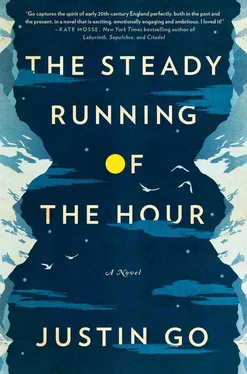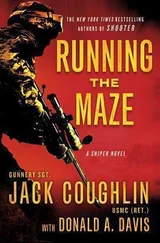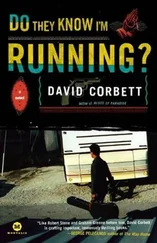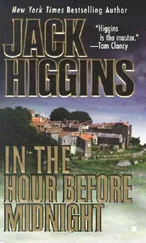1916. Eighty-seven years since she walked into the Somme mist, taking all the answers with her. Six weeks until I lose the fortune. I leave and cross a bridge, walking across a town square and into the travel office of the train station. A young clerk waves me forward.
— Is there a train station in Leksand?
— Sorry?
I write Leksand on a piece of paper and push it across the counter. The clerk types in the info.
— If you make the next train, he says, you can get there at six fifty-three. Change at Borlänge.

The train takes me north through endless pine forests. At each stop the towns seem smaller and smaller. At Borlänge I go to a grocery near the station and buy a bag full of bread and cheese and fruit. I devour half the food on the next train, trying not to worry about where I’ll sleep tonight.
When I get off at Leksand it’s almost seven, but the sun is still bright near the horizon. Only one taxi is parked in front of the station. The driver is sleeping in his seat with the windows down, the radio blaring a talk program. I tap on the car door. The driver wakes and I pass him the map I photocopied in the British Library. Examining the sheet, he blinks wearily and says something in Swedish. I point to a spot circled on the page.
— Can you take me there?
The driver blinks again, speaking in English now.
— There’s nothing there. It’s a tiny island.
— Does a bridge go there?
He shakes his head. — Bridge to what? There’s nothing there. What do you want to go there for?
— A vacation. Can you take me to the lake at least?
The driver shakes his head and mutters. He raises his seat back into position and starts the engine.
— Get in.
We drive for fifteen minutes through thick forests of spruce and birch, the radio still tuned to a call-in show. We turn onto a dirt road. Lakewater glitters in interstices between the slender birch trees. The road ends at the lake’s muddy shoreline.
— This is it, the driver says. You want me to leave you here?
— Sure.
— It’ll be dark soon. It won’t be easy to get back.
— I know.
I pay the driver and lean my backpack against a tree. Across the water an orange sun hovers on the treetops. I study the lake, the water slinking in a white shimmer, the distant little island enveloped by trees. It’d be a long swim and I’m a poor swimmer.
I wander along the shoreline to a dense spruce grove where I find a pair of small boats covered with a plastic tarp. There are muddy tracks where the boats have been dragged into and out of the water. I touch the imprints. They are wet.
The sky darkens and I choose a campsite on a level patch of ground near the boats. I spread my sleeping bag here. If someone comes to take the boats, I’ll see them and maybe get a ride to the island. I don’t have a tent, but the sky above me is cloudless. I read Daily Life in the Trenches under the purple twilight until it’s too dark to see.

The next morning I traverse the shore of the lake, hoping to find a way onto the island. The forest is dense in places and three times I’m forced into the lake to continue on, skipping across rocks or wading in the cool water up to my waist. I continue along the shore until finally I’ve made a full circuit of the lake.
Back at my campsite the sun is high overhead. I go over to the boats and lift the plastic tarp, uncovering an aluminum fishing boat with an outboard motor, beside it a small white dinghy about eight feet long. I flip the dingy over. The hull is lightweight plastic and it lifts easily. There are two aluminum oars inside lashed together with nylon cord. I pick up the oars, looking at the birch trees across the water.
— There’s no choice.
I take hold of the bow and drag the dinghy down toward the lake. The trail is muddy and the boat slides smoothly. At the shoreline I pull off my shoes, toss them in the boat and roll up my pants. I look around, suddenly feeling that someone is watching me, a spectator in the trees. I don’t know who would be watching or why, but I’m anxious and the feeling is hard to shake. I get behind the stern and push the dinghy into the water, then I jump in. The boat bobs pleasantly from side to side as I fit the oars into the rowlocks. I pull one long stroke and glide forward. I scan the trees for other people. No one.
I row toward the north side of the island. It’s hard work and after ten minutes my arms begin to ache. I take a break and row on, watching the glassy wake, the mirrored trees and sky in the water. When I turn around I can see a small wooden pier on the northern tip of the island, so I row the boat north along the shore, avoiding branches of the overgrown trees and shrubs that line the island.
Finally I approach the rough wooden pier. A boat is docked here, another aluminum fishing boat. I tie my dinghy to a post and follow a trail up through the trees, a steep climb through further groves of birch and spruce. As I climb the path I can hear talking and laughing ahead of me. Near the top of the hill the forest opens into a sloped clearing with two wooden houses, both stained the same deep shade of red with white window frames. A field of pristine grass separates the houses. The smaller house is perched higher than the other. It looks far older. At the edge of the clearing beside the larger house, a group of young people sit at a table, talking and laughing. They haven’t seen me. I walk closer slowly.
The group is sipping from tall beer cans, their empty paper plates before them. The young man at the head of the table notices me and stares as the others go on talking. He stands. Now they are all looking at me. A girl in a comic cone-shaped paper hat gets up and says something in Swedish.
I shake my head. — I’m sorry, I only speak English. I’m looking for a house that used to belong to my family. They were named Soames-Andersson.
The Swedes keep staring. I look up at the yellow sun above the trees, feeling dizzy. I explain I’ve come to Sweden to research my family’s history, and I know my relatives once had two buildings here, a summerhouse and a barn. In 1917 my grandmother was born in the summerhouse and the barn was being used as a painting studio.
The girl shakes her head.
— There’s no barn. That other house is really old, but my family doesn’t use it.
— Do you know when they bought this place?
She shrugs. — A long time ago. Maybe the fifties?
The girl studies me for a moment. She has long straight hair and wears round plastic eyeglasses.
— I’ve brought my friends up here for a party—
The girl’s voice trails off. Her friends are all still looking at me. The young man says something to her in Swedish and she snaps at him. They talk for a moment longer, then the girl turns back to me.
— Have you eaten? There’s more food in the house. Why don’t you join us?
After a moment she remembers to smile.

Once I’ve sat at the table the party resumes its course. The young man in cut-off jean shorts introduces himself as Christian, explaining that they’ve all come here for a traditional late-summer crayfish party. He asks a few polite questions about my trip to Sweden, then goes into the house to look for food. He comes back with a plastic tub of potato salad, then puts a cold beer before me and pats me on the shoulder.
— There’s your lunch. We’ll start dinner soon anyway.
The girl with eyeglasses is named Karin. I’m introduced to the other three friends, two girls and another young man, but I’m too distracted to remember any of their names. They’re all drinking heavily. Beside the table there is a cardboard box brimming with empty beer cans. Twice I ask if I can see the old house, but my request is deflected.
Читать дальше













